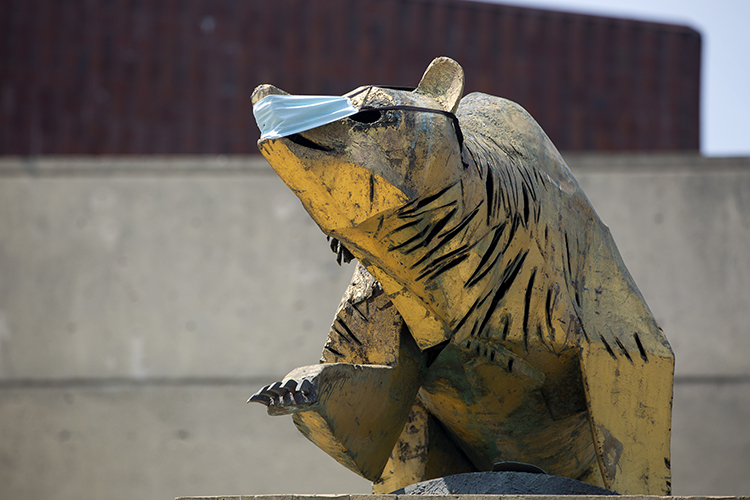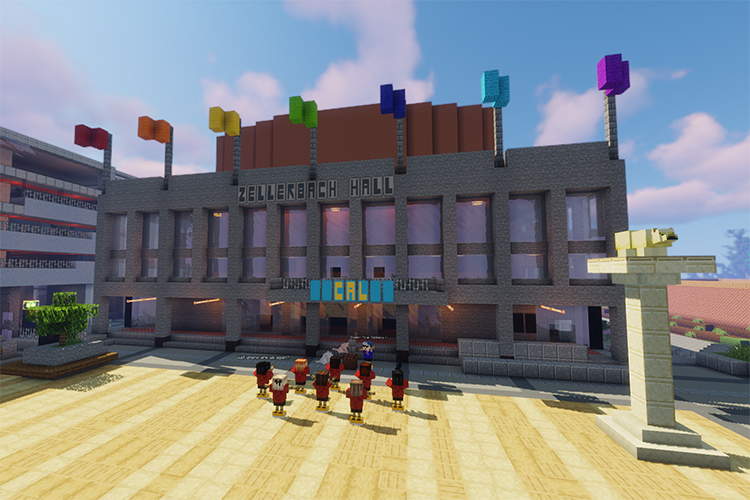Oliver O’Reilly: In a year of turmoil, Berkeley abides
March 9, 2021

In this On My Mind piece, Professor Oliver O’Reilly, who chaired the Berkeley Division of the Academic Senate for much of 2020, reflects on the only-in-Berkeley moments of the last year. (Photo by Brittany Hosea-Small)
On the morning of Sunday, March 8, 2020, I left my colleagues in mechanical engineering at a team-building activity at the Cal Boathouse in Oakland for an urgent conference call that Chancellor Christ had organized with senior campus leadership.
At the time, I was chair of the Berkeley Division of the Academic Senate. While many of us could sense the tsunami of the impending pandemic and stay-at-home orders, I could not have imagined the devastation and dramatic changes it would cause.
Early the next morning, the chancellor sent a message to the campus community announcing that instruction would be remote starting the following Wednesday. Instructors and students had just two days to prepare for this extraordinary change. What the campus had faced the two previous fall semesters with power outages and air quality issues would pale in comparison.

The day before Chancellor Carol Christ announced that UC Berkeley would transition to remote instruction, O’Reilly spent Sunday doing a team-building rowing activity with his mechanical engineering colleagues. (Photo courtesy Oliver M. O’Reilly)
Looking back now, had I known what the last year would actually look like, I think I would have gone into an utter state of denial and despair. Half a million lives in the U.S. would be lost, we would be forced to defend our democracy in the face of a white supremacist insurrection, every meeting I attended and every class I taught would be touched by COVID-19, and we would still be working to return to in-person instruction and gatherings a year later.
But there was a reason I did not despair: Immediately, there was an outpouring of concern and mutual care from my colleagues, and I witnessed the boundless dedication of the campus community. Decisions were made quickly to preserve the instructional mission of the campus. There was little time to gather reams of data and often little time to debate the finer details and nuanced cases (a challenge for the scientists and engineers like me around the table, I must confess).
‘On My Mind’
‘On My Mind’ is a space for senior campus leaders to communicate with the Berkeley community.
Faculty and staff worked extraordinary hours to revise lectures and to compose, revise and update FAQs and guidance for instructors and students. Task forces implemented recommendations before their final reports were completed. I read emails from staff members at 10 p.m. only to see them back online at 6 a.m. the next morning.
The at times contentious and snarky listserv Teachnet, which, for my own sanity, I had avoided for years, became an amazing resource for instructors: Solutions for Zoom glitches, grading policies, remote proctoring, academic integrity and a host of other issues were shared. Messages from the provost’s office that were previously distributed in a quasi random process through the deans and chairs were now shared in weekly “mega meetings” over Zoom, where hundreds of staff and faculty listened directly to the latest developments and shared concerns and information on best practices in the chat.
The crisis extends
The crisis extended into and past spring break. And, as the pandemic spread, our priorities continued to become clear: protect the health of students, faculty and staff. Save jobs and make sure instructors could teach and students could learn.

“The country’s (and world’s) problems also became our campus’s problems,” O’Reilly wrote. The campus food pantry distributed food to the campus community. (Photo by Brittany Hosea-Small)
The country’s (and world’s) problems also became our campus’s problems. Many in our community lacked child care, struggled with basic needs, had mental health concerns and lacked access to quality computer or stable Internet connections. Campus leaders recognized these problems and eagerly implemented solutions. Academic Senate meetings with student leaders in the ASUC and Graduate Assembly that would normally happen once a semester and were often unproductive became weekly events where people listened, shared and acted.
Within weeks, we had updated grading policies, moved instruction online and launched funds to help students meet their basic needs. One alumna donated $1 million to the fund, inspiring countless others to donate. By graduation, more than 500 students built a virtual UC Berkeley in Minecraft called Blockeley University, where we held a virtual commencement that baby boomers and Gen Zers alike were proud to be part of.

More than 500 students built a virtual UC Berkeley in Minecraft called Blockeley University. (Image by Blockeley University)
While there were few people on the campus throughout the summer, the nation was challenged to confront racism and social injustice. The coaches and student-athletes of the women’s basketball team became a beacon of activism for us all. They marched, organized and have continued to keep these issues front and center since the summer.
In an unprecedented show of unity, the Academic Council of the Systemwide Senate requested that all members of the UC community observe a moment of silence and reflection on June 4 to honor the memories of George Floyd and other victims of police murder and brutality.
There was a sense that we shouldn’t let this moment pass without action.”
– Oliver O’Reilly
There was a sense that we shouldn’t let this moment pass without action, like so many others had before it. The effects of systemic racism and social injustice on admissions, hiring, instruction and academic preparation at UC Berkeley rose to the forefront in meetings, proving, unsurprisingly, that Berkeleyans could fight a pandemic, reimagine education and right long-standing systemic wrongs — all at the same time.
Despite the pandemic, the campus’s history project to commemorate 150 years of women at UC Berkeley succeeded in producing a voluminous digital archive that will be a benchmark for institutions worldwide. Campus and departmental committees that were normally dormant throughout the summer met on a regular basis to fulfill their role in helping the campus plan for the fall semester.
Workloads were enormous as we continually developed and revised plans in the hopes that some in-person instruction might be possible. The Graduate Division held workshops to help better prepare graduate student instructors, the Center for Teaching and Learning held workshops for instructors, and Research, Teaching, and Learning Services fortified the digital architecture that supports remote instruction.
Only-at-Berkeley bright spots
Despite the demanding work, there were enormous, only-at-Berkeley bright spots. A former provost and a future Nobel laureate helped lead the campus’s work on testing and health advisories for the fall semester. As I watched student-athletes return to campus and train in Memorial Stadium, I felt a sense of hope that life could return to normal, and that we could keep the Axe.
While that particular hope was dashed, I will never forget the joy and sense of hope I felt listening to a quartet in a music class meeting outside Morrison Hall in October. And who among us will ever forget the news from Stockholm that same month of Berkeley Nobel prizes in physics and chemistry in the same year? To top it all off, the daughter of two former UC Berkeley graduate students and an alumna of UC Hastings School of Law was sworn in as vice president of the United States on Jan. 20.
A return to teaching
I left my post as chair of the Berkeley Division of the Academic Senate in August. Returning to teaching this academic year has made me appreciate some of the issues my teaching colleagues had been facing for the past three semesters. In class, each of the Zoom boxes on my screen is a student who would normally be sitting in my lecture room. Now, I can’t help but feel that I am invading the privacy of their homes with each lecture or question.
Hearing my students’ struggles with mental health, deaths of family members, COVID-19 and technology has been heart-wrenching. At the end of the fall semester, I felt so much happiness and relief to see students who had struggled mightily outside of class pass my course with flying colors. In my 29 years on campus, I have never been prouder of UC Berkeley students.
I am reassured that we are approaching the fall 2021 semester with hopes of in-person engagement, winning back the Axe, and glorious two-hour, agenda-free, in-person committee meetings where we are not managing crises.

“My appreciation and admiration for our custodians, facilities staff, University Health Services, Student Services and our students is endless,” O’Reilly wrote. Here, Hanna Kim, a third-year student majoring in molecular and cell biology who is also is a member of the Berkeley Medical Reserve Corps, wiped down a chair at a UHS vaccine site. (Photo by Brittany Hosea-Small)
In reflecting on all that the past 12 months has dealt us as a campus, my appreciation and admiration for our custodians, facilities staff, University Health Services, Student Services and our students is endless. Most of all, I will remember the countless moments of kindness, concern and compassion that I was privileged to witness as part of our campus community and that kept me going during a historic year of turmoil and tragedy.